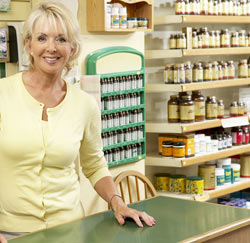Hidden traps a customs broker can help you with
 How much will that bottle of vitamins with super special ingredients or protein powders end up costing you at Customs? That depends, and therein lies the complexity and need for a customs broker.
How much will that bottle of vitamins with super special ingredients or protein powders end up costing you at Customs? That depends, and therein lies the complexity and need for a customs broker.
If you don’t get it right you could easily end up spending $1,200 for two weeks storage alone and you may still not receive the goods… that compares to as little as $300 for the customs broker fee.
Natural health supplements including fitness powders, vitamins and minerals were some of the first products ever sold on the internet and remain a profitable business for many people.
However, there are many traps for those importing these products, especially because Australia has one of the highest levels of regulations governing their sale and the claims you can make about these products. It is easy to end up in court, or have products seized by the Department of Agriculture, Fisheries and Forestry (DAFF) and/or by the Australian Customs and Border Protection Service, all whilst being held back at the warehouse incurring costs.
Whilst it is not a customs broker’s job to advise you on what you can import, and nor would you expect them to have expertise in that area, we do know that you should check with the Therapeutic Goods Administration (TGA) to ensure that you can import the goods before you make the decision to import them.
We happen to have a former public relations consultant for the Complementary Health Care Council (which represents companies selling natural health products) on our team, so she has been able to provide us with a few essential tips:
- You cannot make any claims about the benefits of your products unless you have sound research documentation to back up those claims
- The claims must be approved by the TGA
- The products must been produced in a registered and approved therapeutic facility
- Before they are sold in Australia the products must be fully labelled with the TGA’s approval numbers on the package
- Any advertising must include the TGA approval numbers
- If a product is already on sale is can be a relatively easy process, but if it has unique ingredients you could be in for a long administrative process
- That can all be done once the products arrives in the country, but you cannot begin selling them until the products are authorised and correctly labelled
If the product is for your own personal use and is limited to three months supply for one individual you don’t need a permit, but the products could still be stopped at the import port if Customs or DAFF are suspicious
The TGA is very vigilant about monitoring therapeutic goods sold, and having another country’s approval is not sufficient to sell them in Australia
DAFF and more specifically Customs are also very vigilant, not just because of the TGA requirements, but also because of concern about importing dangerous goods including those items which are listed on the Customs (Prohibited Imports) Regulations 1956.
The role of the customs broker is to make the import of products go as smoothly as possible for you as the importer. It is obviously not a custom broker’s role to have individual knowledge on every product nor to give you specific advice on natural health products. Here we are just pointing you in the right direction.
What customs brokers like Platinum® Freight Management can do is help to speed up the paperwork. The fees are likely to be between $250 and $350, depending on the complexity, but your quarantine warehousing fees could rack up up to $1,200 in two weeks if you haven’t got your paperwork done – and that is without any complication in regards to the TGA, Customs or DAFF (you might as well get used to the acronyms now because you will be awash with them in this field!).
Platinum® Freight Management CEO Peter McRae says that it is even more complex clearing supplements and protein powders due to the fact that suppliers overseas are trademarking names and then when we look at the data sheet to assess the ingredients we are faced with words which end in ‘™’; then when you ask the customer and supplier what does this trademark resemble in regards to an ingredient they don’t wish to disclose the information. The goods are accruing storage, Customs and DAFF cannot assess their eligibility for entry and therefore they need to be destroyed at the importer’s expense.
An Australian customs broker should be one of the first contacts that an importer relies upon as they will need:
- 100% ingredients of the products being imported (on manufacturer letterhead, signed and dated and cross referenced to the commercial invoice)
- Flight/vessel details including shipping documents
- Commercial invoice/s for the goods
A customs broker is directly linked with Customs and DAFF so the paperwork is generally done within 24 hours of the paperwork being received.
Why is the speed of the paperwork important?
Storage fees for air freight cargo generally start 24 hours after the goods have arrived in Australia. For sea freight storage, fees generally commence on the fourth day after the goods have arrived (and weekends are included in that count).
The complications include the fact that you might need to produce an Import Permit to DAFF (which takes time in itself to receive) which has conditions placed upon the goods.
You can find out about import rules of products at www.daff.gov.au/icon or www.customs.gov.au. If you would like further advice on your imports, why not book a one-on-one consultation with one of our friendly customs brokers?
